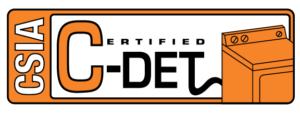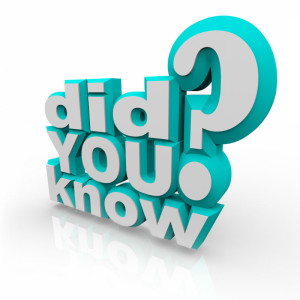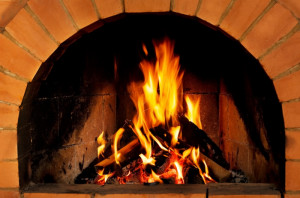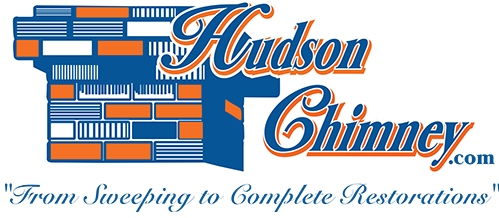by Mark Hudson | Oct 9, 2017 | Chimney Safety Week
The first National Chimney Safety Week was in October of 1978, and it was the first recorded celebration of chimney sweeps in the US. Although we at Hudson Chimney are celebrating National Chimney Safety Week this year, it isn’t about us. As certified chimney sweeps, our number one priority is safety for our customers.
Chimney Fires
According to the US Consumer Product Safety Commission there was an average of 22,300 chimney fires annually between 2011 and 2013. Even though this number shows a decrease over previous years, we think this number is too high! With every fire comes a loss of life, health, and property.
National Chimney Safety Week is designed to educate homeowners, communities, and professionals about chimney safety and fire prevention. It occurs October 1-October 7, but the mission is year-round. Hudson Chimney, as a CSIA member, makes it a priority to educate the community about chimney safety year-round and offer services to further this mission.
Safe Chimneys
Both the National Fire Protection Association (NFPA) and the Chimney Safety Institute of America (CSIA) recommends routine maintenance for the safest and most efficient chimney system. A routine chimney sweep will keep your entire system cleaned of debris, soot, and creosote, that can slow airflow and raise fire risk. Creosote is a highly flammable material that will coat the flue if it isn’t cleaned away.
An annual chimney inspection is essential for ongoing chimney safety. The inspection identifies issues that homeowners won’t recognize until it is too late. A technician will identify hazards, weaknesses, and faulty components in all parts of your chimney system. Learn which level of inspection you should schedule here.
Safe Fires
If your chimney is safe and clean, then you are ready for your first fire of the season. It can be an exciting time of year, but it’s important to remember fire safety this fall and through the holidays, until winter is over. When you practice fire safety, and teach your family to do so, you will all be safer from chimney fires.
- Burn only properly seasoned firewood in your fireplace, insert, or stove. Burning any other items can result in a drop in efficiency, or even a flue fire from a fast-rising material that is aflame.
- NEVER light a fire using any kind of fuel other than wood and kindling. Using gasoline, kerosene, or oil is not safe in any fireplace or appliance.
- Use the damper or glass doors to help control the heat and flame. Never close the damper while a fire is burning, otherwise carbon monoxide and smoke is forced into the house
- Install a screen or custom glass doors to prevent small children from falling into a burning fire.
- Do not hang decorations on or near the hearth. Keep Christmas trees and other large decorations far enough away that they cannot land in the fireplace if they fall.
- Practice fire safety habits and teach your children and guests to follow house rules regarding the fire.
- Install smoke alarms and carbon monoxide detectors, checking batteries monthly.
House fires aren’t always preventable, but chimney fires are! Ask Hudson Chimney about preventative services to help you feel safe this winter.
by Mark Hudson | Apr 25, 2017 | dryer vents
While planning for home safety and disaster preparedness, families often overlook the clothes dryer. While locating exits and the suspected location of a possible fire, the clothes dryer is also a risk. In fact, according to the U.S. Fire Administration there are 2,900 reported clothes dryer house fires per year. These account for five deaths, 100 injuries, and $35 million in property loss. These fires and this damage can be prevented by maintaining the dryer vent properly. The best way to have a safe and efficient dryer? Have the dryer vent installed correctly and to have it cleaned regularly!
 Dangers of a Dryer Vent
Dangers of a Dryer Vent
If the dryer vent isn’t installed correctly it can welcome lint buildups, create obstructions, allow gases to escape the vent, and lead to dangerous fires. In addition, most cities have municipal codes that specify how the dryer vent should be installed.
- According to most manufacturer’s specifications and local codes, dryer ducts should be 4” in diameter, or less, and as large as the dryer outlet.
- Unless otherwise specified by your dryer’s manufacturer or local code, the length of the dryer duct shouldn’t exceed 25 feet. Every 90º turn adds 5 feet for the actual length.
- The dryer vent should be independent of all other systems. They should terminate outdoors only, not in a chimney, crawl space, or attic.
- Your outdoor exhaust vent’s termination hood should prevent back draft to ensure the exhaust doesn’t come back into the home.
- Metal transition ducts should be used between the dryer and exhaust duct.
- Flexible transition ducts should never be used in an attic, a crawl space, or inside a wall.
- The CSIA Certified Dryer Exhaust Technician credential is the only nationally-recognized credential of its kind.
Certified Dryer Exhaust Technicians
So, why opt for a professional installation? You have a better chance of your dryer exhaust vent meeting the standards of your homeowners or renter’s insurance. When you schedule with a Certified Dryer Exhaust Technician, you can rest assured knowing that your technician is experienced and trained in dryer vent safety, installation, and cleaning. Your technician will use the proper materials in the proper proportions. Afterwards, they would be happy to forward-schedule upcoming maintenance appointments. This ensures that your dryer vent hose stays clear of flammable lint that can cause a hazardous fire!
Hudson Chimney has been serving families in Northeast Florida for nearly thirty years and can help you. Have you recently purchased a new clothes dryer? If so, hire a C-DET professional to install your dryer vent hose. It’s the best way to preserve it’s life and your home’s.
Hudson Chimney makes it our priority to keep our customers safe and warm year round, and part of being safe is making sure the dryer vent is in proper working order. If you’re not sure about your dryer vent, you can schedule your annual cleaning and find out more about your system. Call Hudson Chimney at 904-282-4159 or request an appointment online.
by Mark Hudson | Apr 10, 2017 | Chimney Cap
The chimney cap is a vital part of the chimney system that has multiple jobs. The chimney cap is often overlooked, but when it’s gone it’s missed.
The Chimney Cap Keeps Weather Out
The chimney cap is placed at the flue opening. It prevents water from rain, snow, or hail from entering the flue. When the cap is missing, the water drops right into the flue’s opening and can cause water damage throughout the entire system in just a short time.
The Chimney Cap Keeps Wildlife Out
At various times throughout the year, animals seek shelter in chimney flues because they are warm and dry. These animals can bring debris with them. Even scratching the liner, damaging the masonry, blocking airflow, and can suffocate and die resulting in foul odors. A missing chimney cap can also allow sticks and leaves to fall into the flue during fall weather.
The Chimney Cap Keeps the Fire In
At times an unruly flame can throw sparks up the chimney along with the smoke and vapors naturally produced by the fire. If sparks are allowed to escape the flue opening, a fire can result when leaves and debris on the roof are ignited. Sparks have even been known to ignite dry grasses on the ground around the home.
Diagnosing a Chimney Cap Problem
The chimney cap is one component of the chimney system that can be visually inspected quite easily. Assessing your chimney system monthly, year-round, you will notice quickly if something has changed with your chimney cap. If it is turned, shifted, crooked, or missing it should be replaced as soon as possible. Do you have sudden downdrafts that push smoke into your living space? You should take a look at your chimney cap. The cap and screening is designed in a way to allow vapors to vent properly while preventing down drafts from blowing down your chimney. Downdrafts can decrease efficiency substantially and make it difficult to heat or cool your home and keep a fire going.
The most thorough assessment you can do for your chimney? Having a CSIA inspection! This is when a certified chimney sweep inspects your chimney from top to bottom. When you schedule an inspection your technician will notice right away if there’s a problem with your chimney cap. Not only will he point it out in the report, but will check thoroughly for damage caused by the missing cap.
Give Us A Call
Hudson Chimney not only replaces standard chimney caps, but we also specialize in custom chimney caps for our customers that prefer a personalized color or shape. Our chimney experts use stainless steel or galvanized metal to create caps that are both beautiful and functional. Call a Hudson Chimney expert today and get started with your chimney cap assessment and repair!
by Mark Hudson | Apr 22, 2016 | fire safety
When you buy a home, you have to hire a home inspector to make sure there are no hidden problems with any of the major systems in the house. Your home inspector will check out the electrical and plumbing systems, the structure and foundation, and other parts of the home. After you receive the final inspection report, you may believe everything in the fireplace and chimney system works properly, but home inspectors are not necessarily chimney experts. Many of the national fire safety organizations like the National Fire Protection Association (NFPA) and the Chimney Safety Institute of America (CSIA) recommend that the chimney and venting system should be inspected by a professional certified chimney technician before you buy a home. Our CSIA-certified chimney professionals at Hudson Chimney are trained and experienced in finding damage and potential problems in chimneys and fireplaces. You may think you are saving money by not hiring a chimney technician for an inspection before you purchase a house, but there could be a problem with the system that can not only cost you a lot more money in the future, but it could also be a danger to your life. We would like to tell you about the importance of a professional chimney inspection when you are buying a home.

Home inspectors can miss some major problems with a chimney and fireplace system.
While home inspectors have been trained and certified to professionally inspect the major systems of a house, they usually have not received any professional extensive training concerning fireplaces and chimneys. For example, the CSIA reports that a home inspector approved a chimney and fireplace system, which was found to have some major problems by a CSIA-certified chimney sweep. The chimney inspection discovered that the height of the chimney was not tall enough to meet building code regulations, the existence of drywall exposure, and the separation of the hearth from the wall. These problems could cause chimney draft issues, fire hazards, and carbon monoxide leaks. If the homeowner had not hired the chimney sweep because the home inspector found no problems, he or she could experience a devastating fire or become ill from carbon monoxide poisoning.
Home inspectors are not required to thoroughly inspect chimneys.
The most a home inspector will typically do to check out the chimney is using a flashlight to look into the flue. A chimney inspection from the CSIA-certified sweeps at Hudson Chimney will include a video scan from a closed-circuit camera that has been designed to be used inside a chimney. We will have a close-up look at every inch of the inside of that chimney, and we can show you any damage or possible problem we may find. You will also have the needed evidence to show to the homeowner of damage that needs to be repaired before you will agree to purchase the home.
Shopping for a new home? Contact us at Hudson Chimney to schedule an appointment for a professional chimney inspection to be sure the home you are buying poses no dangerous risks from the chimney and fireplace system.
by Mark Hudson | Jan 30, 2016 | Fire Safety Tips
Did you realize that half of the residential fires caused by home heating systems occur during the months of December, January, and February? Since we use our fireplaces, stoves, and other heating appliances frequently during these winter months, this statistic makes sense, but most of these home fires could have been easily prevented by following fire safety precautions. At Hudson Chimney, fire safety is our top priority, and we like to educate our customers on the best ways of operating their fireplaces and other heating appliances. We would like to tell you a few important fireplace safety tips that will keep you and your family warm and safe this winter.
Remember to have your fireplace and chimney professionally cleaned and inspected every year.

The most important preventive maintenance task you can do to avoid fire hazards is to schedule an annual appointment with Hudson Chimney for our chimney sweeping and inspection services. Our Chimney Safety Institute of America (CSIA)-certified chimney sweeps will reduce your risk of chimney fires by removing all of the creosote deposits that have accumulated on the inner walls of your chimney. We will also inspect your chimney to be sure there are no flue blockages or any damage that could cause your chimney to be unsafe to use.
You should always have your heating appliances professionally installed.
The
National Fire Protection Association (NFPA) recommends that all fireplace inserts, stoves, and other heating appliances be installed by certified professionals to protect you from hazards such as accidental fires and carbon monoxide leaks.
Keep the area surrounding your fireplace clear from combustible items.
To prevent an accidental fire being ignited by hot sparks and embers that can jump from the firebox, Hudson Chimney recommends that you keep all flammable items such as furniture, curtains, and rugs at least three feet away from your fireplace.
Set up a sturdy fireplace screen in front of your fireplace.
A metal mesh fireplace screen can prevent accidental fires by keeping hot sparks and embers from flying into the room. This will also protect your children and pets from getting too close to the fire.
Ensure you have smoke and carbon monoxide detector alarms installed in your room.
If you do not already, install these essential alarms in the same room as your heating appliance, outside each bedroom, and on every level of your home. Check the batteries for these alarms when you change your clocks in the spring and fall for Daylight Savings Time.
Need more fireplace safety tips? Contact us at Hudson Chimney to have your safety questions answered.



